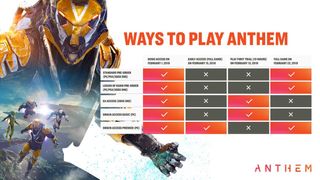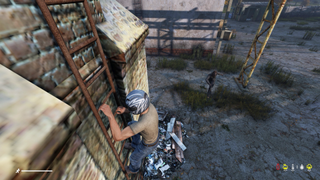Game release dates continue to lose their meaning
In the age of living games, buying something often involves decrypting a developer's meaning of one of several industry terms.

If I can buy and play a videogame, has it released? It's starting to feel like a question for quantum physicists to answer.
To name a few of the ways games are labeled before 'release,' there are pre-alphas, alphas, closed betas, open betas, Steam Early Access releases, backer builds, demos, stress testing, and Origin Access Premier early access—not to be confused with Steam Early Access, which we capitalize to clarify that it's a section within Steam, not a general term. Sometimes these words mean the same thing, or totally different things, or aren't any different from a typical release. Increasingly, they're paired with a spreadsheet's worth of special editions, 'founder's packs,' and pre-order bonuses. It's a mess.
Should early access for Premier subscribers shield EA games from criticism for a week?
The consequence is endless confusion and debate over when it is or isn't acceptable to criticize a game, what should be expected from the games we buy, and whether or not we've truly experienced what a game 'is.' These labels can be useful, but they can also be used to obscure the simple truth that we paid for a game.
Anthem's day one patch wasn't a day one patch at all, for instance, as the game had already been available to Origin Access Premier subscribers for five days. Yet people who paid to play Anthem early were being told by some that they weren't playing Anthem at all—it wasn't out yet. But, also, it was.
Should early access for Premier subscribers shield EA games from criticism for a week? Nah. Those Origin Access Premier subscribers paid their fee to play Anthem for that week, and that experience—good or bad—isn't scratched from existence just because of two words. On Steam, Early Access means that a game is still in development. The way EA uses it, it means you can play the 'full game' before others. That's a significant difference.

What is Early Access?
Even within Steam, though, the meaning of Early Access is hazy. For some studios, it's a safe way to get concentrated feedback from die-hard fans, and that's the only way Steam's guidelines say it should be used. But the reason for releasing in Early Access varies from developer to developer. It can also be a way to get early financing, even if Valve says that's not what it's for. The developer of Project Zomboid directly credits its "stable financial situation" to its release in Steam's Early Access section, where Zomboid has been since 2013.
And for other games, Early Access is simply an "Under Construction" disclaimer meant to fend off reviews and final judgments that might negatively impact the game.
PC Gamer Newsletter
Sign up to get the best content of the week, and great gaming deals, as picked by the editors.
Is Star Citizen a process with no before or after—a space ship production line that never ends?
It's tempting just to ignore developer-applied labels and say, full stop, if you're selling me a game that I can download and play now, you've released it. But I don't want to do that, because good things have come from the end of a rigid 'released' and 'not released' delineation. Early Access games such as Subnautica bring us joy even before they're 'done,' while also funding their developers' efforts to improve them. The Early Access label gives the devs a little leeway at the start, and still lets them promote a 'release day' to the broader public after they're happy with where the game's at. It's great when it works, and I wouldn't have Subnautica, or Slay the Spire, or other Early Access games I've liked do anything differently.
But when on earth is Star Citizen going to be considered a game that's out? Does a game like that, the singleplayer campaign aside, even 'release' like games used to, or is it a process with no before or after—a space ship production line that never ends?
I mean, Fortnite's loading screens still call it an 'early access' game. It's the biggest game in the world. There are multi-million-dollar tournaments. It's made Epic enough money to buy the rights to distribute entire other games. A playable Thanos has come and gone. What is 'early' about anyone's access to it?

So many games are updated for months or years after they release that, often, these labels are entirely superfluous. After five years in Early Access, DayZ only 'released' last year. What is the difference between that and No Man's Sky, which 'fully released' in 2016, but has thoroughly improved since then? Nothing, really, except two words that might've spared No Man's Sky some of the ire it drew back in 2016.
Because there'll never be standardization to any of this—I don't think there can be when games and developers are so different from each other—we just need to look at each of these labels critically on a case-by-case basis, especially when they come from the biggest developers and publishers.
When Hearthstone launched in open beta in 2014, for example, we decided to review it as it was. You could download it, give Blizzard your credit card number, and buy card packs—is it really 'beta testing' if we're testing a revenue model with our real money? That's something we'll have to decide more and more as the distinction between pre-release and release continues to fade away, and more subjective, ambiguous labels are invented to describe what state a game we can buy and play is in.

Tyler grew up in Silicon Valley during the '80s and '90s, playing games like Zork and Arkanoid on early PCs. He was later captivated by Myst, SimCity, Civilization, Command & Conquer, all the shooters they call "boomer shooters" now, and PS1 classic Bushido Blade (that's right: he had Bleem!). Tyler joined PC Gamer in 2011, and today he's focused on the site's news coverage. His hobbies include amateur boxing and adding to his 1,200-plus hours in Rocket League.
Most Popular

